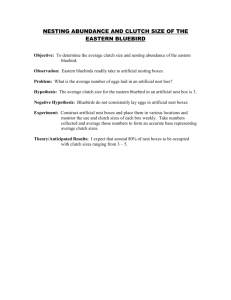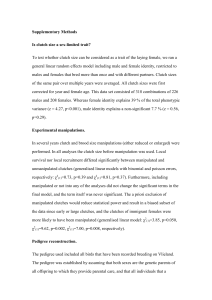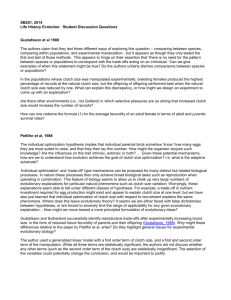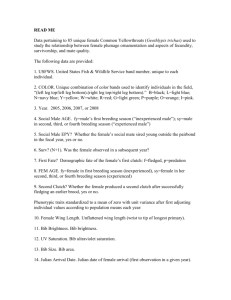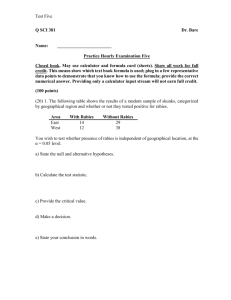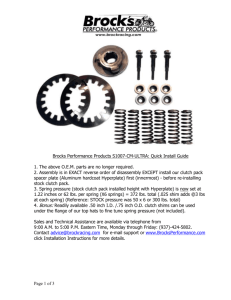Pro_Technical_Bulletin_USA_July_22_2013
advertisement
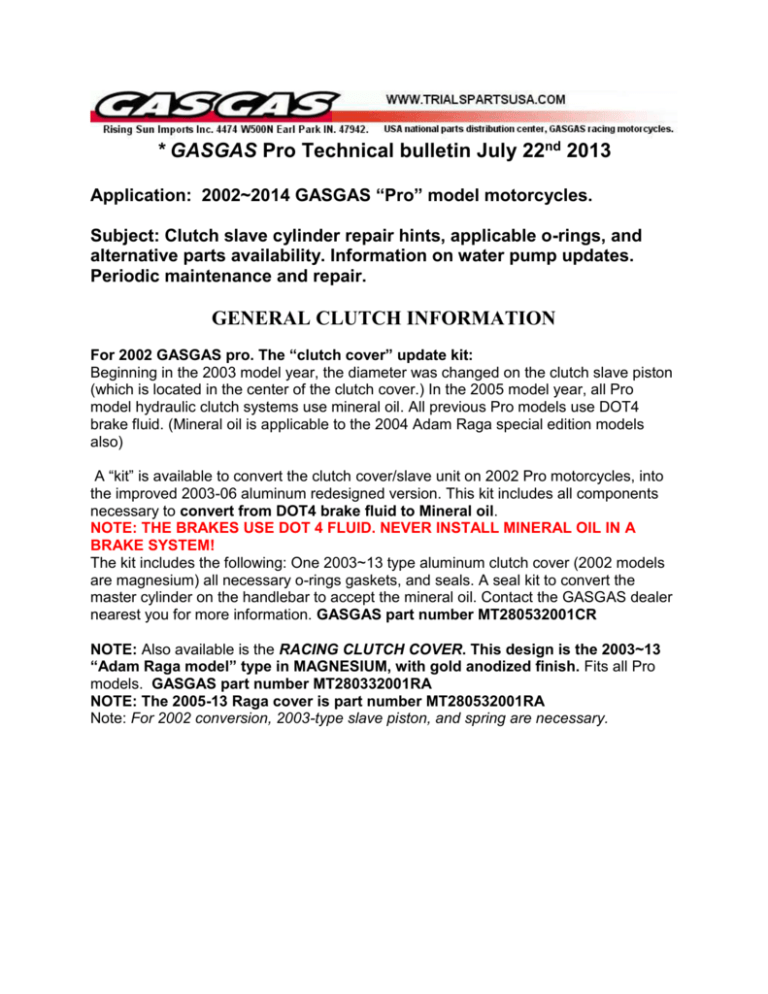
* GASGAS Pro Technical bulletin July 22nd 2013 Application: 2002~2014 GASGAS “Pro” model motorcycles. Subject: Clutch slave cylinder repair hints, applicable o-rings, and alternative parts availability. Information on water pump updates. Periodic maintenance and repair. GENERAL CLUTCH INFORMATION For 2002 GASGAS pro. The “clutch cover” update kit: Beginning in the 2003 model year, the diameter was changed on the clutch slave piston (which is located in the center of the clutch cover.) In the 2005 model year, all Pro model hydraulic clutch systems use mineral oil. All previous Pro models use DOT4 brake fluid. (Mineral oil is applicable to the 2004 Adam Raga special edition models also) A “kit” is available to convert the clutch cover/slave unit on 2002 Pro motorcycles, into the improved 2003-06 aluminum redesigned version. This kit includes all components necessary to convert from DOT4 brake fluid to Mineral oil. NOTE: THE BRAKES USE DOT 4 FLUID. NEVER INSTALL MINERAL OIL IN A BRAKE SYSTEM! The kit includes the following: One 2003~13 type aluminum clutch cover (2002 models are magnesium) all necessary o-rings gaskets, and seals. A seal kit to convert the master cylinder on the handlebar to accept the mineral oil. Contact the GASGAS dealer nearest you for more information. GASGAS part number MT280532001CR NOTE: Also available is the RACING CLUTCH COVER. This design is the 2003~13 “Adam Raga model” type in MAGNESIUM, with gold anodized finish. Fits all Pro models. GASGAS part number MT280332001RA NOTE: The 2005-13 Raga cover is part number MT280532001RA Note: For 2002 conversion, 2003-type slave piston, and spring are necessary. Clutch cover o-ring selection and applications: Application: 2002 model Pro (all engine sizes) With original magnesium 2002 clutch cover using two o-rings. Fix for early 2002 Pro machines with problems of o-ring expansion (swelling) We have found a green o-ring that are actually the USA "SAE" size, but are a nice fit on most 2002 bikes with good results. These do not swell when exposed to brake fluid and transmission oil. Get them from Rising Sun Imports, or you can order them at your local Car Quest store. Green o ring, carquest part number CTC407008 Exception: Please note that on some bikes where the "post~piston" tolerance is tighter, the green o-rings may not fit correctly. You will know this, as the slave piston will be very difficult to install, or may not pass over the green o-rings without being forced. In this case, use the black 2003~06 o-rings as described in the next paragraph. 2003~06 black o ring, GASGAS part number MT280432047 Application: 2003~04 model Pro. With brake fluid system. All engine sizes. (Except the special 2004 Adam Raga edition) The 2003-04 standard production machines use one o-ring and one cup seal in the clutch slave. Rising Sun Imports now has a high quality black o-ring from GASGAS in the correct metric size. Used in the innermost position on the 2003~06 version, and fits the 2002 as well. (At both post positions.) They are made of a special Teflon coated aerospace synthetic rubber. This rubber is impervious to most common petrochemical compounds. Please note: As previously mentioned, the 2002 motorcycles with tight slave piston tolerance are best with this 2003~06 type o-ring. 2003~06 black o ring, GASGAS part number MT280432047 2003-04 cup seal for brake fluid. Part number MT280332049 Application: Special 2004 Adam Raga edition, most 2005 Pro models These machines use mineral oil in the hydraulic clutch system. NOTE: THE BRAKES USE DOT 4 FLUID. NEVER INSTALL MINERAL OIL IN A BRAKE SYSTEM! The clutch cover uses an o-ring and a cup seal on the outer post position. These rubber compounds are designed for mineral oil. 2003~06 black o ring, GASGAS part number MT280432047 2004 Raga model, 2005 mineral oil cup seal MT280532049 Hydraulic clutch mineral oil part number MT280432700 Clutch cover o-ring selection and applications. Continued Application: Special 2005 Adam Raga edition, some late production 2005 Pro models, and all 2006 Pro models These machines use mineral oil in the hydraulic clutch system. NOTE: THE BRAKES USE DOT 4 FLUID. NEVER INSTALL MINERAL OIL IN A BRAKE SYSTEM! Effective mid-year 2005, the clutch cover uses two o-rings on both post positions. These rubber compounds are designed for mineral oil. If your 2005 machine uses an o-ring, and a cup seal, refer to above specifications for 2004. Both o-rings are the same. The part number is MT280432047 Hydraulic clutch mineral oil part number MT280432700 Helpful hints: NOTE: Always work clean, with no oil contaminants on the parts. (Use "carb cleaner" on the metal parts, blow dry to absolute clean. Drain or disconnect the hydraulic hose from the cover so fluid doesn’t enter while you work.) Use "sparingly" only silicone grease to lubricate parts for assembly. (Find the grease at NAPA or Car Quest etc..) Clean hands; do not contaminate the o-rings with fluids or cleaners. Do this, and the repair will last for a long time. Why so clean? Flooding the slave with fluid on piston assembly, can cross contaminate the two systems (Trans oil~brake fluid). Oil on your hands can contaminate the o-rings during assembly. Fluid types for hydraulic system: NOTE: We are now using DOT 5 silicone brake fluid in pre-mineral oil systems and have had excellent results. Alternatively, use the factory recommended DOT 4. On mineral oil systems, you may obtain genuine GASGAS mineral Oil from your GASGAS dealer. Hydraulic clutch mineral oil part number MT280432700 Transmission oil: Recommend type: ATF DEXRON III Alternatives: NOTE: GASGAS Spain recommends only Dexron III automatic transmission oil at this time. Oil type warning: DO NOT USE #12378508 GM auto-trac II (blue) oil Never use synthetic oil in the transmission~clutch. The synthetic oils are “stickier” and this adhesion tendency, when applied to the areas between the clutch plates contribute to excessive clutch drag. Some brands of synthetic oil will chemically react when mixed with water, (from creeks, rain, or waterpump seal leakage). This reaction alters the pH factor of the oil. This acidic condition accelerates corrosion of steel engine parts, and loosens the bond of the clutch fiber plate material. Please do not second-guess this information. We have twelve years of experience with the Herbringer/Adige brand clutch plate materials, and we are in direct contact with the technical department at GASGAS Spain. New clutch bolts and tool: Beginning in the 2003 model year, there is a new bolt for the clutch. End forever the aggravation of the ten little Allen clutch bolts on the 2002 pro. This new bolt was designed exclusively for GASGAS and uses a 7mm 12-point socket, or box end wrench. No more Allen bolts to “round out”. The bolt part number is MT280332077 (replaces T0324010) The metric 12-point socket tool part number is MT280332077UTL Clutch pack measurement: In the diagram below, you will see measurements for proper functioning of the “pro” model clutch. If you see that the measurement of the complete disc pack is higher or lower than specified, you should replace the pack. Complete clutch pack. Fiber and metal discs. MT280432055 Diagram specification correction NOTE: Change to diagram below. It states clutch pack thickness is 9.75 +/- 0.1 – The correct specification is: No less than 9.75mm and not more than 10.05mm 2006 and newer model Installation note: The clutch fiber and steel discs were changed in the 2006 model year. The three fiber discs have a variation in thickness and the two steel discs are thicker than the previous models. There may be slight variations in thickness of the fiber discs, this is done at the point of manufacture to ensure precise total pack width. The total pack width is 10.0~10.01mm – The two steel discs measure 2.0mm each – Two of the fiber discs measure approximately 1.80~1.85mm thick and the third one is 2.2mm thick. All steel and fiber discs are symmetrical (there is no specific front or back side) IMPORTANT: Of the three fiber clutch plates, one is noticeably thicker. (about 2.2mm thick) This thickest plate MUST be the one that is placed into the engine first. (Farthest into the interior and against the rear surface of the center clutch driven hub.) NOTE: If the ten clutch fulcrum levers (fingers) have no free play, this is an immediate indication that the thickest fiber plate is not is the innermost position. Assembly sequence of clutch slave components (ALL) How to properly reassemble the outer clutch cover WARNING: The motorcycle must be laid on its side when replacing the clutch cover. As the following photos show, if the clutch outer cover is assembled while the motorcycle is in an upright position the clutch actuation fingers can fall outward by the force of gravity. During reassembly, the slave piston can get behind one or more of the fingers. There is no way to determine that the installation is correct unless the motorcycle is laid upon its side for this operation. This way, the force of gravity insures that the clutch actuation fingers are in the proper position. If this procedure is not followed, upon starting of the engine, the internal parts of this assembly can be seriously damaged. The potential problem associated with improper assembly is shown in the following two photographs. PHOTOS OF IMPROPER assembly of clutch slave and fulcrum lever components For the reason shown in these cutaway photo examples, we recommend the machine always be placed on its side for the replacement of the clutch cover. This way, gravity insures that the clutch fulcrum levers (fingers) stay in position during reassembly. Kick Start Shaft alignment (INDEXING): When assembling the kickstart shaft, the indexing of the gear, shaft, and spring are as shown in the two photos below. When the gear is correctly installed on the shaft, the spring will align as shown in the photo on the left. The right photo shows the position of the parts when checking for proper indexing. NOTE: There have been updates to the shaft and gear. The second version of the shaft and gear differ in the angle of the spiral cut on the shaft exterior and the corresponding interior surface of the gear. Second version parts stamped "B" have a steeper incline to the spiral. This makes the gear reach the engagement point sooner and gives slightly more revolutions to each kick of the pedal. They do not interchange. The original type gear is no longer available. The gear and shaft assembly are sold as a matched pair under the part number MT280226002R The new type replacement “B” gear can be purchased under the original part number of MT280226002 New kick-start shaft – Beginning in 2011, to facilitate a clearance issue with the new chassis design, the kick-start shaft was lengthened by 6mm. See image below. (The old version is 90mm in length, the newer one is 96mm long.) NOTES: Except for the outer pedal-end of the shaft, they are the same. The longer shaft can be installed on older engines. When attempting to use the shorter shaft on newer machines, there may be a problem with the pedal coming in contact with the chassis above the footpeg area. 2009 and 2012 CHANGES OF THE INTERNAL KICK-START “STOPPER” Proper position of the plastic (or aluminum) “stop” for the kick start mechanism. (part number MT280226011) Please note in the photos below the correct mounting position for the stopper. Factory changes and case modification: Beginning in the 2009 model year, the left crankcase machining process is modified to insure the correct position of this “stop”. Please review the images below as on the older engines, it is very important to correctly position the kickstart pedal stop. Additionally, in the 2012 model year the material (nylon) was changed to a malleable aluminum alloy. All versions have an identical shape and use the same part number (Notes; The original white “nylon” plastic “stop” may appear to be pink as over time it absorbs dye from the transmission oil, new plastic ones are opaque white as shown in these images below.) Old crankcase 2009 and newer crankcase with machining modification Correct position of return stopper beginning in 2009 Water Pump information, Pro 2002~13: Beginning in 2004, there are three changes to the waterpump. 1 The center shaft has a new heat treatment. The part number remains the same. 2 The impeller is made of a new material. The part number remains the same. 3 The outer bushing (drain cap) is made of a new alloy. It has a much longer life than the original model. The new cap uses a “Torx” bit for removal, and installation. The original one used an Allen wrench. (See photo) The part number remains the same. IMPORTANT INTERNAL TRANSMISSION NOTE: Be aware that there are differences in quality of Genuine GasGas and aftermarket bearings. When repairing an engine, it is best to use the GENUINE GASGAS type bearing shown in this photo. (left side of image) It is important that on the secondary shaft “split” needle bearings, that you use only the genuine GasGas part. (Part number MT280236161) These original bearing-halves should contain 10 needles of the length shown. (20 needles for the two combined halves) Please be aware of the fact that the use of inferior quality bearings may cause wobble of the respective gears as well as improper load support. This may lead to premature failure of these components. Additionally: As mentioned elsewhere in this bulletin, it is important to change the transmission oil as per recommendations. Contaminated oil will shorten the life span and may lead to failures. In this photo, the new type bearing is on the left. On the right is a 9needle type (INCORRECT) bearing and these needles are shorter in length. NEW THERMOSTAT The new thermostat was first introduced in the 2005 model TXT Pro. The purpose of this thermostat is to more precisely control the engine temperature range. It is not necessary to replace this as it is only an improvement, not a necessity. There were no inherent problems with the original one. TRIAL PRO MOTORCYCLES- Periodic revisions: Engine oil – One of the most important things for the Gas Gas engine is the clutch, and for the clutch, the most important thing is the proper type of transmission/clutch oil, and that it is clean at all times. The quality of the oil in the engine can make all the difference in the performance of the clutch and gearbox. The oil in a trial engine gearbox, apart from the lubrication of the gears, has the responsibility of dissipating the clutch heat. Due to the importance and constant use of the clutch in trial, it is normal that the oil deteriorates very quickly. In order to have correct operation, Gas Gas recommends a periodic exchange of the engine oil. The moisture that can be produced by water coming into the engine when the machine is operated in streams or wet weather or by internal condensation because of humidity and/or extremes of temperature can adversely affect the operation of the clutch. (Remember that the clutch discs are made from organic materials that are very sensitive when they are exposed to water or humidity). The oil that GASGAS recommends is ATF (Automatic gearbox Dexron III) Radiator/cooing system pressure – Additionally, it is important to be certain that the radiator breather hose is not depressed. If this tube does not have free aspiration, the pressure-cap release valve will not work properly and it is possible that accumulated pressure of more than 1 bar (14.5 PSI) can affect the cooling system. If this happens, the pressure in the system will increase and it may cause leakage of the water pump seal and anti-freeze/coolant may enter the transmission case. Crankcase venting – It is also very important to always have the crankcase vent hose properly routed to a high place in the chassis and then turned downward at the end so as to prevent the entry of water. Making sure that this vent hose is not pinched by any components or cable ties, and that it is free to breathe. As the internal engine temperatures vary, the gasses inside the crankcase must be allowed to equalize with the outside atmospheric pressure. In addition, you must be certain that you always replace the center clutch-hub bolt with the one that has a small hole in its center. This is the passageway for the crankcase to breathe into the vent-nipple which is located on the left side of the engine near the front chain sprocket. As always, specifications are subject to change without notice.
